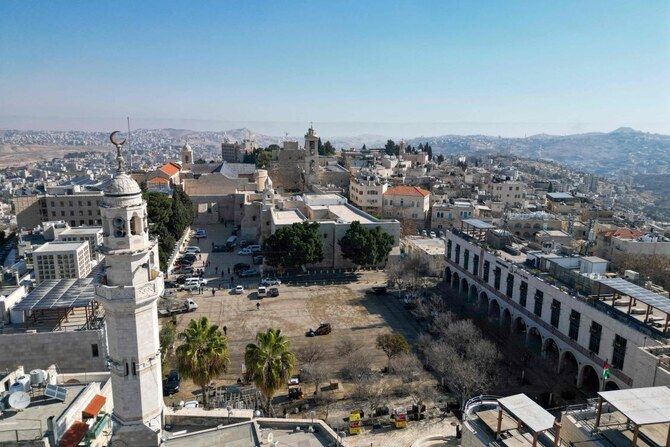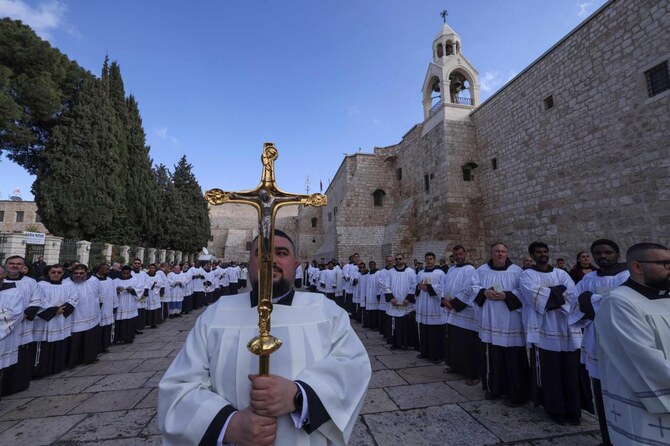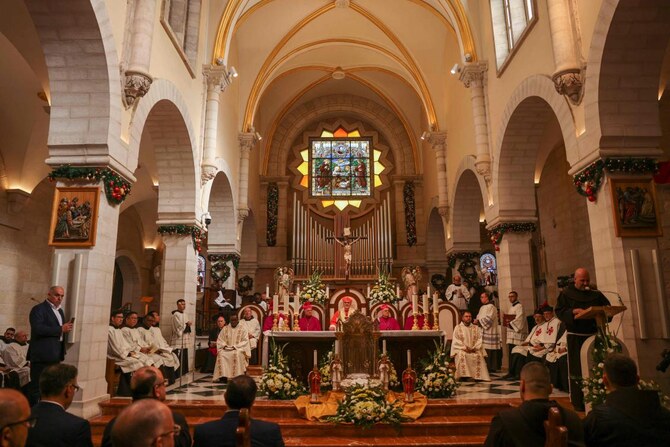BETHLEHEM: Palestinian security forces deployed around the Church of the Nativity in the West Bank holy city of Bethlehem on Tuesday, as the faithful prepared for another solemn Christmas overshadowed by the war in Gaza.
An unusual calm enveloped Manger Square, the heart of the Palestinian city dominated by the revered church that marks the site where Christians believe Jesus Christ was born.
The white-walled compound and its surrounding plaza were empty, save for a few vendors selling coffee and corn and a significant contingent of journalists, an AFP reporter saw.
Missing for a second consecutive year were the decorations, bustling tourists and crowds of pilgrims that were staples of Christmases past, reflecting the somber mood as the war between Israel and Palestinian militants in the Gaza Strip drags on.
The fighting in Gaza — which is separated from the occupied West Bank by a swath of Israeli territory — erupted after Hamas’s deadly attack on Israel on October 7 last year.
Traditionally, a grand Christmas tree would light up Manger Square, but local authorities opted against elaborate celebrations for a second year.
“This year we limited our joy,” Bethlehem mayor Anton Salman told AFP.
“We want to focus on the Palestinian reality and show the world that Palestine is still suffering from the Israeli occupation, still suffering from the injustice.”
Prayers, including the church’s famed midnight mass, will still be held in the presence of the Catholic Church’s Latin Patriarch, but the festivities will be of a more strictly religious nature than the festive celebrations the city once held.
Despite the gloomy mood, some Christians in the Holy Land — who number about 185,000 in Israel and 47,000 in the Palestinian territories — are finding refuge in prayer.
“Christmas is a feast of faith... We’re going to pray and ask God to end our suffering,” Salman said.
Vendors in front of the local municipality building, the Bethlehem Peace Center, waited for customers in vain behind pots full of steaming coffee.
Mohammad Awad, 57, has been selling coffee for more than 25 years at the foot of the Mosque of Omar, whose elegant minaret stands directly opposite the Church of the Nativity.
“Business was good before the war, but now there’s no one,” the vendor lamented. “I hope the war in Gaza will end soon and that tourists will return.”
While most streets were quiet, a handful of visitors could still be seen in the area.
“On one hand, it’s sad that there are so few people,” said Christiana von der Tann, a German who came with her husband to spend the holidays with her daughter, a journalist in Tel Aviv.
“But then you can access the Church of the Nativity as you can freely go inside... That’s the advantage.
“But it’s very sad for the people here, it’s very sad they can’t sell their goods. They’ve got a really hard time.”
Violence across the Israeli-occupied West Bank has surged since the war in Gaza broke out, but Bethlehem has remained largely quiet, even though the fighting has taken a toll on the now predominantly Muslim city.
Foreign tourists, on whom Bethlehem’s economy almost entirely relies, stopped coming due to the war. And an increase in restrictions on movement in the form of Israeli checkpoints is also preventing many Palestinians from visiting.
“Last night, there was a rocket attack in Tel Aviv and it was a little scary,” said Tann.
“We had to go to a shelter room. That was a special experience. You don’t forget that you are in a country at war.”
Security deployed as wartime Bethlehem readies for another somber Christmas
https://arab.news/gj76a
Security deployed as wartime Bethlehem readies for another somber Christmas

- Missing for a second consecutive year were the decorations, bustling tourists and crowds of pilgrims that were staples of Christmases past
Hamas says ‘lost contact’ with group holding Israeli-American hostage after strike

“We announce that we have lost contact with the group holding soldier Edan Alexander following a direct strike on their location. We are still trying to reach them at this moment,” Abu Obeida, spokesman for the Ezzedine Al-Qassam Brigades, said on his Telegram channel.
The Brigades released a video on Saturday showing Alexander alive, in which he criticized the Israeli government for failing to secure his release.
Alexander appeared to be speaking under duress in the video, making frequent hand gestures as he criticized Prime Minister Benjamin Netanyahu’s government.
AFP was unable to determine when the video was filmed.
Alexander was serving as a soldier in an elite infantry unit on the Gaza border when he was abducted by Palestinian militants during their October 7, 2023 attack on Israel.
The soldier, who turned 21 in captivity, was born in Tel Aviv and grew up in the US state of New Jersey, returning to Israel after high school to join the army.
Out of the 251 hostages taken on October 7, 58 remain in captivity, including 34 whom the Israeli military says are dead.
Nearly a month after Israel resumed its aerial and ground assaults across Gaza, the Palestinian militant group said on Monday it had received a new ceasefire proposal from Israel.
A senior Hamas official told AFP that Israel had proposed a 45-day ceasefire in exchange for the release of 10 living hostages.
The Hamas official said that the Israeli proposal calls for the release of Alexander on the first day of the ceasefire as a “gesture of goodwill.”
Over 2m displaced people to return to Khartoum over six months: UN

- “Our estimate in IOM is that over the next six months, we will have 2.1 million returning to the Khartoum capital,” Mohamed Refaat, its chief of mission in Sudan, said
- The returns, he said, would depend on “the security situation and... the availability of services on the ground“
GENEVA: The United Nations said Tuesday that it expected more than two million people displaced in war-ravaged Sudan to return to Khartoum within the next six months, if security conditions allow.
Fighting erupted in Sudan on April 15, 2023 between the army, led by Abdel Fattah Al-Burhan, and the paramilitary Rapid Support Forces, headed by his former deputy Mohamed Hamdan Dagalo.
As the world marks the two-year anniversary of the devastating conflict, which has killed tens of thousands of people and uprooted around 13 million, the UN’s International Organization for Migration noted the need to prepare for many of the displaced to begin returning home to Khartoum.
The capital city became a battleground almost from the start, but since the army recaptured it last month, the agency said “we are seeing people returning, we are seeing hope coming.”
“Our estimate in IOM is that over the next six months, we will have 2.1 million returning to the Khartoum capital,” Mohamed Refaat, its chief of mission in Sudan, told reporters in Geneva, speaking from Port Sudan.
This calculation, he said, was “based on the numbers we understand that... left the capital when the war started.”
“So we estimate that 31 percent of... IDPs (internally displaced people) in Sudan after the war are actually coming from Khartoum,” he said, adding that the agency expected around half of them to “be returning back to Khartoum.”
The returns, he said, would depend on “the security situation and... the availability of services on the ground.”
Getting the city ready for a mass influx will be a challenge, Refaat acknowledged.
“We see that some spots in the Khartoum itself have been cleaned, but the process I’m sure will take longer,” he said, adding that “the electricity system in the whole Khartoum has been destroyed.”
Refaat also warned that “as we see people are returning, the war is far from stopped,” with thousands still being displaced elsewhere in the country, especially in the Darfur region.
“The conflict has to stop, and we need to put all effort for this conflict to stop,” he said.
But Refaat acknowledged that the funds raised to address Sudan’s towering needs were far from sufficient.
The IOM unveiled a response plan Tuesday asking for nearly $29 million to reach around half a million people in Khartoum, including returnees, he said.
Israeli authorities close Hebron’s Ibrahimi Mosque during Passover holiday

- Closure prevented Palestinians from accessing the site as Israeli settlers celebrated the Jewish holiday
LONDON: Israeli authorities closed the Ibrahimi Mosque in Hebron, which is in the occupied West Bank, as part of security measures during the Jewish holiday of Passover.
Jamal Abu Aram, the Palestinian director of the Hebron Waqf Department, said that Israeli authorities on Monday evening closed the mosque, with all its corridors and courtyards, for two days.
The closure meant Palestinians were barred from accessing the site as Israeli settlers celebrated the Jewish holiday of Passover, the Wafa news agency reported.
Passover is observed from April 12 to April 20, when Jewish communities commemorate the Israelites’ exodus from Egypt more than 3,000 years ago.
The Ibrahimi Mosque, known to Jews as the Cave of the Patriarchs, has been a site of conflict since 1994. Israeli authorities have imposed strict military and security measures in the old city of Hebron, where the mosque is located, with nearly 1,500 soldiers stationed there to protect the 400 settlers in the area.
Israeli PM Netanyahu’s party steps up pressure for Shin Bet head to go

- Shin Bet has been at the center of a growing political battle pitting Netanyahu’s right-wing government against an array of critics
- Likud said Bar had lost the trust of the government
JERUSALEM: Israeli Prime Minister Benjamin Netanyahu’s Likud party accused the head of the domestic intelligence organization on Tuesday of turning parts of the service into “a private militia of the Deep State” and called for him to go, amid a deepening political crisis around the agency.
The accusation against Shin Bet head Ronen Bar, who is resisting an order for his dismissal, followed the arrest of a Shin Bet official on suspicion of leaking confidential information to journalists and a government minister.
Shin Bet, which handles counter terrorism investigations, has been at the center of a growing political battle pitting Netanyahu’s right-wing government against an array of critics ranging from members of the security establishment to families of hostages in Gaza.
A government bid to sack Bar, during an investigation by the agency into aides close to Netanyahu, has been temporarily frozen by the Supreme Court, which held a hearing into petitions against the dismissal last week.
Likud said Bar had lost the trust of the government and “must stop entrenching himself in his position and vacate his position immediately.”
The case, which has fueled demonstrations by thousands of protesters who accuse Netanyahu of undermining Israeli democracy, has exposed deep rifts between the government and one of the country’s key security organizations.
Part of the dispute centers around blame over the failures that allowed Hamas gunmen to rampage through communities in southern Israel on October 7, 2023, killing 1,200 people and taking 251 hostage in Israel’s worst-ever security disaster.
Netanyahu said last month he had lost confidence in Bar over Shin Bet’s failure to forestall the October 7 attack. But critics have accused the prime minister of using the case as a pretext to stop a police and Shin Bet investigation into alleged financial ties between Qatar and a number of Netanyahu aides.
Bar has acknowledged his agency’s failures ahead of October 7 and said he would resign before the end of his term. But he has accused Netanyahu, who has not acknowledged any responsibility and rejected calls for a national inquiry into October 7, of a major conflict of interest.
A Justice Ministry statement lifted a censorship order banning reporting on the case, but said the identity of the official who had been detained could not be revealed.
Netanyahu tells Macron: Palestinian state ‘huge reward for terrorism’

- Netanyahu expressed to the French president his “strong opposition to the establishment of a Palestinian state, stating that it would be a huge reward for terrorism“
- The French president said he told Netanyahu that “the ordeal the civilian populations of Gaza are going through must end“
JERUSALEM: Israeli Prime Minister Benjamin Netanyahu told French President Emmanuel Macron on Tuesday that the establishment of a Palestinian state would be a “huge reward for terrorism.”
Macron, meanwhile, posted on X that he had told Netanyahu the suffering of civilians in Gaza “must end” and only a ceasefire in the war with Hamas would free the remaining Israeli hostages in the territory.
A statement released by Netanyahu’s office said the two leaders spoke by phone and the Israeli prime minister expressed to the French president his “strong opposition to the establishment of a Palestinian state, stating that it would be a huge reward for terrorism.”
“The prime minister told the French president that a Palestinian state established just minutes away from Israeli cities would become a stronghold of Iranian terrorism, and that a vast majority of the Israeli public firmly opposes this — and this has been his consistent and long-standing policy.”
For his part, the French president said he told Netanyahu that “the ordeal the civilian populations of Gaza are going through must end,” and called for “the opening of all humanitarian aid crossings” into the besieged Palestinian territory.
Israel has cut off all aid to the Gaza Strip since March 2 to pressure Hamas.
The call came after Macron’s comments last week that Paris could recognize a Palestinian state within months sparked a wave of criticism in Israel, including from Netanyahu and his son, as well as right-wing groups in France.
On Monday, he said he hoped French recognition would encourage others to follow and that countries which did not recognize Israel should also do so.
The day before the call, Macron told the president of the Ramallah-based Palestinian Authority, Mahmud Abbas, that he would support a plan for the PA to govern post-war Gaza, if it underwent reform.
“It is essential to set a framework for the day after: disarm and sideline Hamas, define credible governance and reform the Palestinian Authority,” Macron told Abbas in a phone call, according to a post on X.
“This should allow progress toward a two-state political solution, with a view to the peace conference in June, in the service of peace and security for all,” wrote Macron.
Israel has been battling Palestinian militant group Hamas in the Gaza Strip since the latter attacked Israel on October 7, 2023.






















